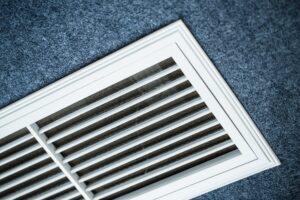The Importance of Indoor Air Quality in Commercial Spaces
In today’s commercial environments, from schools to offices, maintaining superior indoor air quality (IAQ) is essential for health, productivity, and compliance. Poor IAQ can lead to respiratory issues, reduced cognitive function, and increased absenteeism, costing businesses billions annually. With California facing stringent regulations like AB 2232 for school ventilation mandates, and growing adoption of the WELL building standard, commercial property owners must prioritize strategies such as advanced air filtration, ultraviolet germicidal irradiation (UVGI), and IAQ sensors.
The WELL building standard focuses on health and well-being through optimized building design and operations, emphasizing clean air to minimize pollutants. AB 2232, signed into law in 2022, mandates that California schools ensure HVAC systems meet minimum ventilation rates, install MERV 13 or higher filters, and deploy CO2 monitors for ongoing air quality assessment. This legislation underscores the state’s commitment to healthy learning environments, especially post-pandemic.
At Air-Tro, serving Monrovia, Pasadena, and the surrounding regions since 1969, we specialize in commercial HVAC solutions that integrate these IAQ standards. Below, explore WELL strategies, filtration technologies, UVGI systems, sensor monitoring, and AB 2232 requirements, helping you create safer, more efficient commercial spaces.
Understanding IAQ Standards: Why They Matter for Commercial Buildings
IAQ standards are frameworks designed to ensure buildings provide clean, breathable air. The WELL building standard, for instance, sets requirements to reduce indoor pollutants and promote ventilation, directly impacting occupant health. In commercial settings, these standards translate to lower sick days, higher employee satisfaction, and even LEED certification synergies.
California’s AB 2232 specifically targets schools, requiring HVAC inspections, minimum ventilation per Title 5 regulations, and CO2 monitoring to maintain safe indoor environments. Non-compliance can result in fines or operational disruptions, making it critical for educational institutions to upgrade systems. Beyond schools, these principles apply to offices, retail, and healthcare facilities, where IAQ directly influences customer experience and regulatory adherence.
Implementing IAQ standards involves a multi-faceted approach: enhancing ventilation, filtering contaminants, disinfecting air with UVGI, and using sensors for real-time data. This not only meets mandates but also boosts energy efficiency and sustainability.
WELL Building Strategies for Superior Indoor Air Quality
The WELL building standard offers comprehensive strategies to elevate IAQ in commercial buildings. Key tactics include increasing ventilation rates to dilute contaminants, using demand-controlled ventilation to adjust airflow based on occupancy, and incorporating displacement ventilation for efficient air distribution.
Reducing volatile organic compounds (VOCs) is another cornerstone, achieved by selecting low-emission materials and avoiding scented products. Mold and moisture control prevents microbial growth, while eliminating combustion sources like gas stoves minimizes pollutants.
For commercial applications, WELL encourages continuous air quality monitoring to keep CO2 levels below thresholds, ensuring fresh air intake. Energy recovery ventilators (ERVs) can enhance ventilation without spiking energy costs, aligning with green building goals. By adopting these strategies, businesses can achieve WELL certification, demonstrating a commitment to occupant well-being.
Advanced Air Filtration: Meeting MERV Standards and Beyond
Air filtration is a frontline defense in IAQ management. Commercial buildings should aim for MERV 13 filters or higher, as recommended by ASHRAE, to capture fine particles like viruses and allergens. In schools, AB 2232 mandates MERV 13 installation where feasible, or the highest compatible level, to protect students and staff.
HEPA filters offer even greater efficiency for high-risk areas, while regular inspections ensure seals remain tight and filters undamaged, and European standard EN 16798-3 guides filtration for industrial and commercial spaces, emphasizing solutions tailored to building needs.
At Air-Tro, we install and maintain filtration systems that comply with these standards, reducing airborne contaminants and extending HVAC lifespan.
UVGI: Disinfecting Air with Ultraviolet Technology
Ultraviolet germicidal irradiation (UVGI) uses UV-C light to inactivate microbes, improving IAQ without chemicals. Installed in HVAC ducts or as upper-room systems, UVGI disinfects air as it circulates, effective against bacteria, viruses, and mold.
In commercial settings, UVGI complements filtration and ventilation, especially in high-occupancy areas like schools. Proper placement ensures safety, avoiding direct exposure. For post-occupancy disinfection, running UVGI for 30 minutes can clear rooms effectively.
This technology aligns with WELL strategies by reducing contaminants, making it ideal for AB 2232-compliant school upgrades.
IAQ Sensors: Real-Time Monitoring for Optimal Air Quality
IAQ sensors provide data on key metrics like CO2, PM2.5, TVOCs, temperature, and humidity, enabling proactive management. In commercial buildings, sensors integrate with HVAC for demand-controlled ventilation, optimizing energy use.
AB 2232 requires CO2 monitors in classrooms for continuous assessment. Advanced sensors like those monitoring multiple pollutants support WELL certification by ensuring levels stay within healthy limits.
Air-Tro offers sensor installations that deliver alerts and analytics, helping maintain compliance and comfort.
AB 2232 School Ventilation Mandates: Compliance and Implementation
AB 2232 mandates that California schools, including private ones, upgrade HVAC systems to meet ventilation standards, install MERV 13 filters, and use CO2 monitors. This addresses the $45 billion annual cost of poor IAQ in California.
Implementation involves inspections, filter upgrades, and sensor deployment. For schools unable to meet MERV 13, alternatives must be justified. These mandates extend benefits to all commercial educational facilities.
Choose Air-Tro for Commercial IAQ Solutions
Air-Tro provides end-to-end services for commercial customers, from WELL consultations to AB 2232 compliance. Our experts handle installations, maintenance, and upgrades, ensuring your systems meet IAQ standards efficiently.
Embracing WELL strategies, filtration, UVGI, sensors, and AB 2232 compliance transforms commercial spaces into healthier environments. Contact Air-Tro at (626) 357-3535 or fill out our online form to schedule an assessment. Invest in IAQ now for lasting benefits for years to come.
The post Commercial IAQ: WELL Strategies, Filtration, UVGI & AB 2232 appeared first on Air Tro | Air Conditioning Los Angeles | Air Conditioning Pasadena.
Whether you require installation, repair, or maintenance, our technicians will assist you with top-quality service at any time of the day or night. Take comfort in knowing your indoor air quality is the best it can be with MOE heating & cooling services Ontario's solution for heating, air conditioning, and ventilation that’s cooler than the rest.
Contact us to schedule a visit. Our qualified team of technicians, are always ready to help you and guide you for heating and cooling issues. Weather you want to replace an old furnace or install a brand new air conditioner, we are here to help you. Our main office is at Kitchener but we can service most of Ontario's cities
Source link



